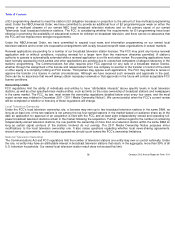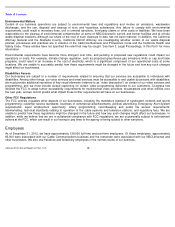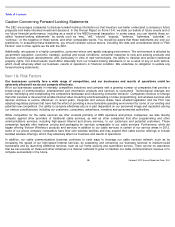Comcast 2012 Annual Report Download - page 30
Download and view the complete annual report
Please find page 30 of the 2012 Comcast annual report below. You can navigate through the pages in the report by either clicking on the pages listed below, or by using the keyword search tool below to find specific information within the annual report.
Table of Contents
Privacy and Security Regulation
The Communications Act generally restricts the nonconsensual collection and disclosure to third parties of cable customers’
personally identifiable information by cable operators. There are exceptions that permit such collection and disclosure for rendering
service, conducting legitimate business activities related to the service, and responding to legal requests. The Communications Act
and FCC regulations also provide privacy protections for customer proprietary network information related to our voice services.
Several states and numerous local jurisdictions have enacted privacy laws or franchise privacy provisions that apply to cable
services.
The FTC has begun to exercise greater authority over privacy protections generally, using its existing authority over unfair and
deceptive practices and other public proceedings to apply greater restrictions on the collection and use of personally identifiable and
other information relating to consumers. In March 2012, the FTC staff issued a final report with guidelines for privacy limits in the
collection and use of personal and profiling information, even in the absence of demonstrated consumer harm. In a February 2012
report, the White House and Commerce Department also had suggested an expansion of privacy protections, although with greater
reliance on the development of enforceable industry codes. Legislation has also been introduced in Congress that would regulate the
use of personal and profiling information for advertising. The FTC has encouraged the World Wide Web Consortium to develop limits
on the online collection and use of personal and profiling information. In addition, the FTC is reviewing its implementation of the
Children’s Online Privacy Protection Act (“COPPA”).
COPPA imposes requirements on website operators and online services that
are aimed at children under 13 years of age or that collect personal information or knowingly post personal information from children
under 13 years of age. The FTC has proposed certain changes to its COPPA regulations that would expand the scope of the
regulations. We cannot predict what proposals may ultimately be adopted or how such requirements would affect our businesses.
We are also subject to state and federal regulations and laws regarding information security. Most of these regulations and laws
apply to customer information that could be used to commit identity theft. Substantially all of the U.S. states and the District of
Columbia have enacted security breach notification laws. These laws generally require that a business give notice to its customers
whose financial account information has been disclosed because of a security breach. In addition, the FTC is applying the
“
red flag
rules,”
which are designed to detect the warning signs of identity theft, in the Fair and Accurate Credit Transactions Act of 2003 to
both financial institutions and creditors; we have established a compliance program as required under these rules. Legislation also
has been introduced in Congress that would impose new cybersecurity requirements on some critical networks and operations, but
the scope of such requirements, if adopted, has not yet been defined. The White House is considering a similar Executive Order.
We are also subject to state and federal “do not call”
laws regarding telemarketing and state and federal laws regarding unsolicited
commercial emails. Additional and more restrictive requirements may be imposed if and to the extent that state or local authorities
establish their own privacy or security standards or if Congress enacts new privacy or security legislation.
Advertising Restrictions
Legislation has been introduced and reports from various government agencies have been issued from time to time urging that
restrictions be placed on advertisements for particular products or services, including prescription drugs and the marketing of food or
violent entertainment to children. We are unable to predict whether such reports will result in legislative proposals, whether legislative
proposals may be adopted, or, if adopted, what impact they will have on our businesses.
27
Comcast 2012 Annual Report on Form 10
-
K
























